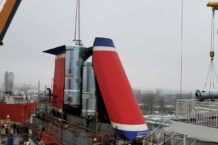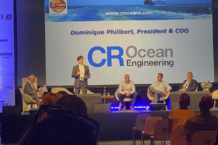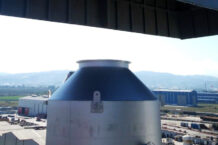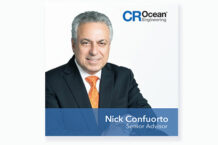CROE Now Offering The Oberlin Filter Washwater Treatment System For Scrubber Washwater Dry Sludge Removal
We are pleased to announce our new partnership with Oberlin Filter Company, a well-established, highly reputable company with five decades developing filtration systems. The Oberlin Filter Maritime Scrubber Washwater Systems provides an automatic, low-maintenance washwater filtration system that supports diesel exhaust scrubbers removing dry sludge from scrubber discharge water treatment. They integrate seamlessly with any scrubber system we install. The Oberlin Filtration System is offered for worldwide marine applications exclusively through CR Ocean Engineering. Email us for more information.
CROE Marine Scrubbers Available in Three Configurations

CR Ocean Engineering scrubbers are ideal for use in a wide range of vessels, such as RO-RO, Ferries, Cruise Ships and Container Ships. They are designed for both new builds and retrofits with single engines or multi-streaming operations. CROE exhaust cleaning systems are available in three standard configurations: Open Loop; Closed Loop, and Hybrid System.
MARPOL Annex Vi
The International Convention for the Prevention of Pollution from Ships, known as MARPOL, has promulgated regulations whose purpose is to preserve the marine environment through the prevention of pollution by oil and other toxic substances. Annex VI of MARPOL, adopted in 1997, specifically regulates exhaust gas emissions with standards which tighten over time.
Our Marine Exhaust Gas Scrubbers
Our Marine Exhaust Gas Scrubbers meet our customer’s MARPOL compliance with state-of-the-art environmentally sound solutions, while offering maximum efficiency and design flexibility at the lowest possible costs. With over 60 years of proven experience, CR Engineers are ready to make all adaptations needed and provide on-going support.
CR Ocean Engineering
For over sixty years, CR engineers have provided solutions for those who face the challenge of efficient resource utilization and the responsibility for meeting the most stringent emission standards. While current and proposed regulations call for swift compliance, the imperative of efficient resource utilization has become standard operating procedure throughout the world.
Recent Posts
Scrubbing emissions double earnings for ships over those that don’t: Report
CR Ocean Engineering new President and COO Dominique Philibert at the Envirotech Forum Online
CSA welcomes EU’s first maritime environmental impact report
While non-scrubber fitted VLCC’s earnings drop to historic lows, returns on scrubber-equipped vessels nearly double
President & COO Nick Confuorto Retires









